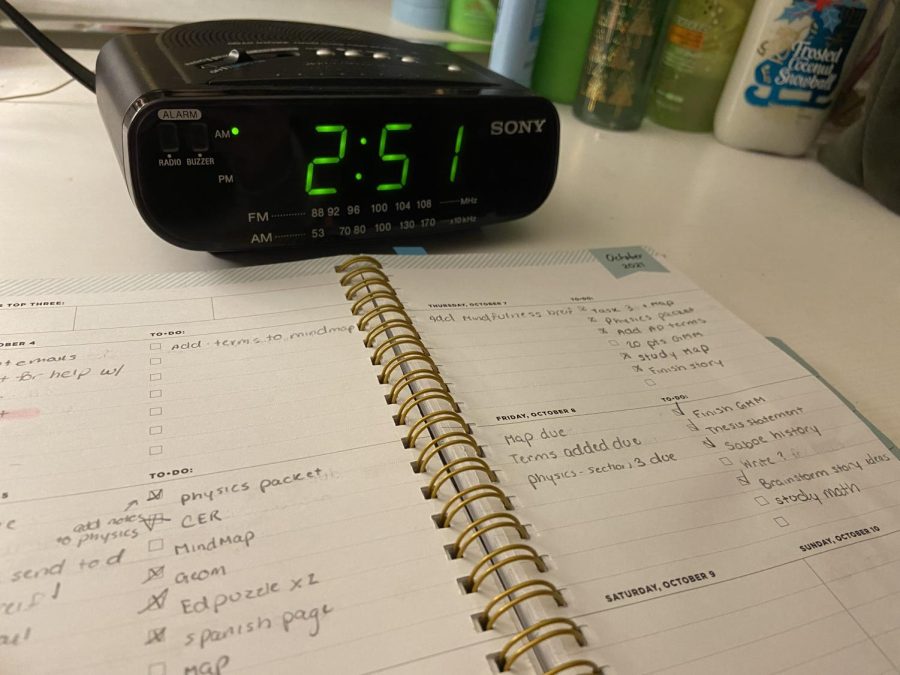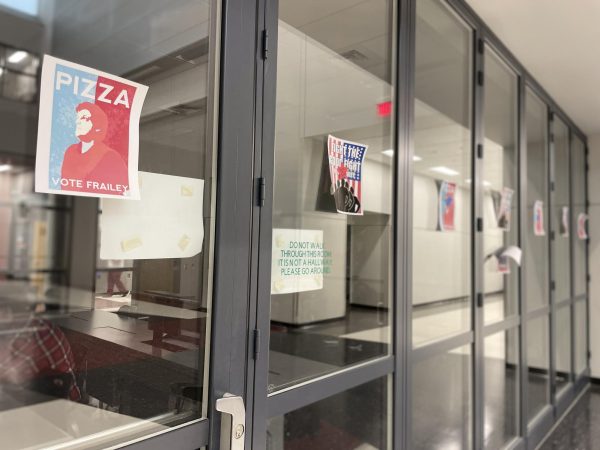Homework negatively affects teen sleep schedules
As the end of the first quarter approaches, junior Kelly Terrebone works hard to complete her assignments before the deadline. Terrebone finished her work at 2:51 a.m.
On a survey done of 100 students, many teens have admitted their sleep schedule has affected them in a negative way.
The American Academy of Sleep Medicine recommends at least eight – 10 hours of sleep for any adolescent between the ages of 13 and 18. The survey done shows that 72.0% of students admitted to sleeping only three – four hours each night.
“Waking up in the morning I just feel drowsy,” junior Mason Crownover said. “I truly can’t remember the last time I’ve woken up during the week and felt refreshed and ready for the school day, but I know how important academics are so I pull myself together and just get ready.”
When asked why, 91% of students said that homework was what was keeping them up through the night.
“Between cheer, work and having any kind of social life, sometimes I can’t start my homework until 11 p.m.,” junior Kelly Terrebone said. “On average, I typically have about two hours per night. I’m not the type of person to not do my homework, so I make sure everything is complete before I even think about going to bed no matter the hour.”
However, this has not gone unnoticed by teachers. Some teachers have started to curb the amount of homework they give to their students.
“I always do my best to stay in touch with the student perspective,” Spanish teacher Dane Leone said. “I have been listening to some things that my students have been saying and there is a lot being crammed into their schedules. If you think about it, from the minute a student walks into school their entire day is scheduled for them. Security checks, reporting room, periods one through eight; then, the school day is up. The only unstructured time students have, unless they are lucky enough to have a study hall, is during lunch. And once the school day is over, many students have sports that they sometimes have to travel long distances for. By the time some of these kiddos finally get some free time, it may be 9 p.m. or 10 p.m. and only then can they start working on their homework. My goal for curbing homework assignments this year is to hopefully give my students some time to relax, enjoy their lives outside of school, and find some time to focus on themselves, their family, and their friends.”
According to Cleveland Clinic, some side effects of not getting enough sleep can include:
- Depression
- Obesity
- Impaired Immunity
- High-blood pressure
- Diabetes
- Heart Attacks
“I know that my sleep schedule is unhealthy, but I would rather see a 100% on a test after I got two hours of sleep, rather than an 85% after getting eight hours,” Terrebone said. “School is beyond important to me, and I will do anything to see a 100% in the grade book, even if it ends up affecting my overall health.”
Some students have stated that they believe they have an advantage in school, due to their healthy sleeping habits.
“On average, I typically get seven to nine hours of sleep per night, depending on the amount of homework each night,” senior Ashtyn Hileman said. “One night I didn’t get enough sleep, and I was trying to read a book for one of my classes. I couldn’t focus enough to even get through the first chapter. If a student is doing that everyday, I can’t imagine how that feels for them and how badly it has affected their grade, even if they don’t notice it.”
School nurse Renne Weidlich, believes that the amount of sleep that adolescents are getting, could potentially be dangerous to their bodies.
“Lack of sleep can decrease your response time in certain situations in school and outside of school,” Weidlich said. “It can affect the ability to concentrate and focus on all aspects of the school environment. It can also worsen your mood and behavior. Lack of sleep has a negative effect on memory and blocks the brain’s ability to learn.”

Hello! I'm Cassidy Klock, and I am the Editor in Chief for the AAHS Mountain Echo. I've always had a passion for writing ever since I was a little girl,...







![Chemistry Champion. Chemistry teacher Christine Falger was designated a comic book superhero during the 2023-2024 school year. She poses with her seventh period honors chemistry class, accepting the award. This is a result of the Climate and Culture squads work around the school, which focuses on building teacher morale. [Being part of a squad] is a big time commitment. We as a squad are required to give one hour of time a month, I am probably anywhere from eight to 12 hours a month, Krug said. [But the squads work] can make the high school a better place. I am really lucky to work with a number of teachers who also feel the same way. Even if we are doing more than some squads at the high school, we still feel like what were doing is really important.](https://aahsmountainecho.com/wp-content/uploads/2024/04/Chrissy-Falger-Comic-Book-Superhero-Honors-Chemistry-1-e1712174011111-600x369.jpg)





![Dedicated. Teachers who live far away commute for at least an hour to work each day. [Made with Canva]](https://aahsmountainecho.com/wp-content/uploads/2024/04/teacher-commute-picture-424x600.png)


Korri F. • Oct 13, 2021 at 3:53 pm
Wow, a healthy sleep schedule within 8-10 hours blows my mind. Most of my school nights dont fall in place, I get at most- 6hours. We come together in school for 8hours and most people have jobs now. I work sometimes until closing on school nights and don’t get to start my homework until 12:15Am. I don’t believe homework is truly beneficial when it comes to our health and etches our life OUTSIDE of school.
Navay'on Helton • Oct 13, 2021 at 12:28 pm
Facts yo. Curb the homework, because us youngins are tying to live life.